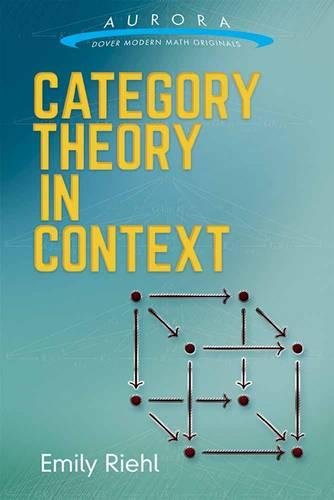
Category Theory in Context
by Emily Riehl
Publisher: Dover Publications 2016
Number of pages: 258
Description:
This concise, original text for a one-semester introduction to the subject is derived from courses that author Emily Riehl taught at Harvard and Johns Hopkins Universities. The treatment introduces the essential concepts of category theory: categories, functors, natural transformations, the Yoneda lemma, limits and colimits, adjunctions, monads, Kan extensions, and other topics.
Download or read it online for free here:
Download link
(1.3MB, PDF)
Similar books
 Higher Operads, Higher Categories
Higher Operads, Higher Categoriesby Tom Leinster - arXiv
Higher-dimensional category theory is the study of n-categories, operads, braided monoidal categories, and other such exotic structures. It draws its inspiration from topology, quantum algebra, mathematical physics, logic, and computer science.
(12848 views)
 Categories, Types, and Structures
Categories, Types, and Structuresby Andrea Asperti, Giuseppe Longo - MIT Press
Here is an introduction to category theory for the working computer scientist. It is a self-contained introduction to general category theory and the mathematical structures that constitute the theoretical background.
(19007 views)
 Category Theory and Functional Programming
Category Theory and Functional Programmingby Mikael Vejdemo-Johansson - University of St. Andrews
An introduction to category theory that ties into Haskell and functional programming as a source of applications. Topics: definition of categories, special objects and morphisms, functors, natural transformation, (co-)limits and special cases, etc.
(12989 views)
 Higher-Dimensional Categories: an illustrated guide book
Higher-Dimensional Categories: an illustrated guide bookby Eugenia Cheng, Aaron Lauda - University of Sheffield
This work gives an explanatory introduction to various definitions of higher-dimensional category. The emphasis is on ideas rather than formalities; the aim is to shed light on the formalities by emphasizing the intuitions that lead there.
(13621 views)